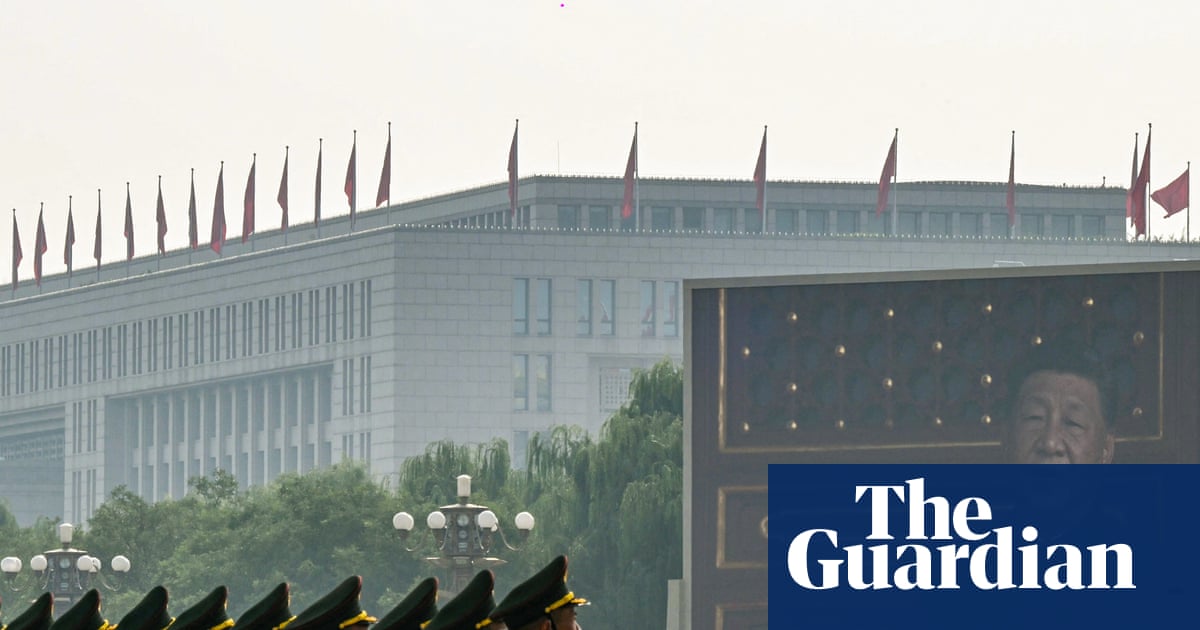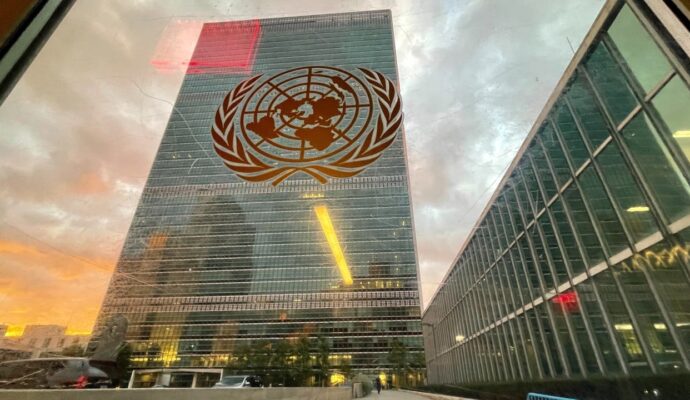
Good morning. All eyes have been on China this week as the second biggest global economy flexed its muscles.
Dozens of world leaders, including from the global south, authoritarian pariah states and the EU, attended China’s largest ever military parade on Wednesday to mark the 80th anniversary of the end of the second world war, which China calls the war of resistance against Japanese aggression.
China’s president, Xi Jinping, was flanked by the Russian and North Korean leaders, Vladimir Putin and Kim Jong-un, in what has widely been called a show of defiance to the west. It is the first time all three leaders – who were chatting and shaking hands as they walked the red carpet in Tiananmen Square – have been seen together.
The others in attendance included Belarus president Aleksandr Lukashenko, Iran’s Masoud Pezeshkian, and Myanmar junta chief Min Aung Hlaing.
It was a highly choreographed display of power from the emerging (emerged?) global superpower, with a formidable guest list that was designed to send a message to the rest of the world.
But what was that message? How does Xi hope to reshape geopolitics, and what will a more confident China mean for global human rights? I spoke to Amy Hawkins, the Guardian’s senior China correspondent, to find out. That’s after the headlines.
Five big stories
UK news | Deputy PM Angela Rayner has admitted she underpaid stamp duty on her £800,000 seaside flat, after coming under intense pressure to be more transparent about her property arrangements.
Russia | Vladimir Putin has invited Kim Jong-un to visit Russia during a lengthy meeting in Beijing on the sidelines of China’s biggest military parade, as Kim promised to do “everything I can to assist” Moscow.
Police | The Metropolitan police have declined to drop their investigation into the comedy writer Graham Linehan for tweets about trans issues, and said that the law used by officers to detain him needs reviewing.
Israel | Israeli drones dropped four grenades near UN peacekeepers in south Lebanon, the agency’s force said on Wednesday, in what it described as “one of the most serious attacks” on its personnel since a November ceasefire.
Portugal | A day of national mourning has been declared in Portugal after at least 15 people were killed when Lisbon’s well-known Gloria funicular railway car derailed and crashed on Wednesday.
In depth: China’s display of might
China’s massive display of military hardware and personnel was the culmination of a week of diplomatic grandstanding. The weekend before the military parade, dozens of leaders had descended on Tianjin, in northern China, for the annual summit of the Shanghai Cooperation Organisation.
Amy Hawkins told me that when the annual summit first started in the 1990s, it included China, Russia, and several central Asian countries. “It has since expanded to 10 members and several more partner countries. It now also includes India and other Eurasian countries, central Asia, and other non-western, largely autocratic countries. The grouping represents nearly half of the world’s population and positions itself as an alternative to US-led multilateral organisations.”
During the summit, Xi Jinping announced plans to accelerate the creation of a development bank and set up an international platform for energy cooperation, in partnership with Russia and India. The summit was Indian prime minister Narendra Modi’s first visit to China in seven years.
Leaders from the US such as Donald Trump (more on him in a bit), western Europe, Japan, South Korea, and other major democracies were not in attendance at the summit or the military parade.
“Instead, you had the leaders of Russia, North Korea, Iran, Myanmar, Indonesia, Zimbabwe, and other global south countries. It showed a united front from these anti-western or anti-US countries. It was a display of might and getting behind China’s vision,” Amy said.
Reshaping the global order
The US is seen as the undisputed global superpower, but China has, in recent years, been on its tail vying for the top position. What would a world dominated by China’s political, military and economic might look like? Amy explained China has no real interest in replacing America as the world’s police because it conceives of the global order differently from the US.
“China’s principle is that it doesn’t get involved in other countries’ affairs, but whether that’s actually the case in reality is debatable. China has always said they respect other country’s sovereignty. It rejects the idea of universal values. And that’s obviously very appealing to smaller and often autocratic countries who don’t want to be told what to do by the US, and don’t want to be criticised for their human rights records,” Amy said. “It is more that China wants to reshape the global order in a way that’s suitable for its aims both domestically and abroad.”
While China says it rejects the idea of a so-called “new cold war” with the US, the week’s summit and parade show a real hardening of a China-led bloc of largely authoritarian, anti-western leaders, Amy said. “This week really showed the pull of Beijing’s power and signalled its aim of reshaping the global order.”
Many analysts specifically focused on the show of a united force between Xi, Vladimir Putin and Kim Jong-un. “It’s the first time the three have been seen in public together. China has always had a close relationship with Russia and North Korea, but in the past year or so, Russia and North Korea have independently become closer and they’ve signed a mutual defence treaty. North Korea has sent thousands of troops to help Russia during its war in Ukraine, and has sent weapons,” Amy said.
“And as Russia and North Korea become closer, there was some speculation that China was being frozen out of the anti-western bloc. But by having all three leaders together in Beijing, with it being Kim Jong-un’s first reported international trip since 2019, it reaffirms that China is the most powerful player in that relationship.”
Peace v War
Xi’s speech during the military parade warned that the world was facing a choice between “peace or war, dialogue or confrontation, win-win or zero-sum”.
“It was aggressive and while these speeches are often quite bombastic – it is a military parade after all – it wasn’t the kind of speech that was trying to placate or calm any western fears about China’s military might,” Amy said.
The 70-minute parade featured tanks, drones, long-range and nuclear-capable missiles, fighter jets and stealth aircraft. There were reports of the J15-DT, China’s new carrier-based electronic warfare jet, and a new submarine-launched intercontinental ballistic missile.
“China has been learning lessons from the war in Ukraine and has been thinking specifically about how it might fend off an assault on Taiwan and any aid that comes to Taiwan in that event,” Amy said.
Xi and the Chinese Communist party claim Taiwan is part of China, with which it vows to “reunify”. Taiwan’s democratically elected government and its people are opposed to this.
In response to the parade, Taiwan’s president, Lai Ching-te, said: “The people of Taiwan cherish peace, and Taiwan does not commemorate peace with the barrel of a gun.”
The end of US-China cooperation
The US had its own military parade overseen by Donald Trump in June, but it is notable how underwhelming it was when compared with Beijing’s. The US president was watching the events that took place in China, responding in typical Trump fashion on his Truth Social platform.
“He sent this sarcastic message saying, ‘Congratulations to Xi, Putin and Kim, enjoy conspiring against the US,’” Amy said. While on one level he was critical, “Trump clearly has sympathy and admiration for the idea of showing off your country’s strengths through a massive military parade. So I wouldn’t be surprised if he was also a bit jealous.”
Another key message from this week was the end of the so-called “golden era” of US-China cooperation, most notably on climate change. “The US has become increasingly hawkish on China, both under Trump and Biden. The mood in China is that there’s not really much room to negotiate with the US. There’s no love lost between the two countries,” Amy said. “What’s important to China is to build up its alliances that are independent of any western system; such as ensuring energy security by buying more oil and gas from Russia and ensuring stability on the border with North Korea.”
The rise of China’s dominance comes off the back of a US global retreat, which will have an impact on human rights. Amy explained that cuts to USAID funding, which supported civil society groups, as well as the US’s erratic policies around tariffs as part of Trump’s America First agenda have left a vacuum on the global stage. And much to its delight, China doesn’t even need to be proactive in filling it.
“Many countries see China as the more reliable partner, economically, politically,” Amy said. This is especially true for smaller and less powerful countries who once looked to the US for support, she added.
after newsletter promotion
“It is quite clear that China is going to be providing more political stability and money, without demanding democratic reforms or human rights protections. The erratic behaviour of the US in recent years has alienated many states, and China is benefiting from that.”
Therefore, as China and the US tussle for global dominance, one casualty for the rest of the world is human rights and civil liberties.
What else we’ve been reading
On a train at the weekend I was shocked to see how yellow every single field was; I couldn’t remember it looking like this when I was younger – it looks weird. Lucy Jones’s piece on our fried landscape and the damage heatwaves and drought do to nature struck a chord with me. It feels like death by a thousand cuts. Phoebe
Labour’s former shadow chancellor doesn’t hold back the punches as he gives Keir Starmer five steps to turn around his failing premiership. While it’s unclear Starmer will listen, his advice is well worth a read. Aamna
Really cool and compelling data in this piece illustrates Europe’s population decline, showing how the rise of the far right could further drive economic downturns by cracking down on immigration. Phoebe
There are only three months left of the year – did you gasp? I did when I realised – so make it worthwhile by checking out at least one of the performances from this amazing list of theatre, comedy or dance shows coming up this autumn. Aamna
Green party leader Zack Polanski says he admires Nigel Farage’s ability to tell stories and communicate with voters. Can he harness “eco-populist” energy to be a real voice for progressive politics in the UK, without caving to Farage (unlike Labour)? George Monbiot clearly thinks so. Phoebe
Sport
US Open | Naomi Osaka turned back 11th-seeded Karolina Muchova for a 6-4, 7-6 quarter-final victory in just under two hours’ time. Amanda Anisimova had a sensational 6-4, 6-3 quarter-final victory against second-seeded Iga Swiatek in 1hr 36min. Félix Auger-Aliassime defeated the eighth seed Alex de Minaur 4-6, 7-6 (7), 7-5, 7-6 (4) to reach the semi-finals.
Football | West Ham’s official fan advisory board, which represents more than 25,000 supporters, has issued a vote of no confidence in the club’s board.
Cycling | The Professional Cyclists’ Association has demanded better security at the Vuelta a España after protesters disrupted stages in recent days, with one rider crashing when demonstrators ran on to the road.
The front pages
“Rayner in peril after admitting she underpaid stamp duty on flat” says the Guardian, and the Times has “Rayner on brink after stamp duty admission”. Similar in the Financial Times: “Rayner fights for political survival after admitting to stamp duty underpayment”. The Daily Mail demands “Is Starmer so spineless that he won’t sack his deputy PM (and housing secretary!) who dodged £40,000 in stamp duty?”. The Express runs with “‘If PM had backbone he would sack her’” – Kemi Badenoch said that. In not it’s best work, the Metro says firing her is “A no-Rayner”. The Telegraph in mocking paraphrase says “I didn’t pay the right tax, but it’s still not my fault”. The deputy PM makes it into the puff boxes of the Mirror but the top story is about the late Virginia Giuffre: “Andrew accuser’s family: We’ll keep fighting”.
Today in Focus
Is curiosity the key to ageing well?
Psychologists have traditionally believed we become less curious as we age, but recent research has shown that curiosity actually becomes more targeted and specific in our later years. To find out why this happens, and how maintaining broad curiosity into older age can help keep our brains young, Madeleine Finlay hears from Dr Mary Whatley, an assistant professor of psychology at Western Carolina University, and Dr Matthias Gruber, of Cardiff University’s Brain Imaging Centre
Cartoon of the day | Ben Jennings
The Upside
A bit of good news to remind you that the world’s not all bad
In the age of Hinge there is something particularly lovely (and old-fashioned) about this story of a couple who first met when they were 16.
Bruna De Luca fell for Giacomo in a bar while on holiday in a tiny Italian mountain town called Atina. They had a summer fling before Bruna moved back to Edinburgh for her studies. They couldn’t make it work long distance and they had no mobile phones to keep in touch.
One summer, 12 years after the relationship ended, Bruna saw Giacomo at the same bar where they had met all those years ago. They were in their 30s by then but the flame was very much still there. This time, they had mobile phones, so exchanged numbers and started visiting each other. A new chapter opened in a story they thought had ended, and they have now been happily married for more than a decade with children of their own.
Sign up here for a weekly roundup of The Upside, sent to you every Sunday
Bored at work?
And finally, the Guardian’s puzzles are here to keep you entertained throughout the day. Until tomorrow.


